Program: Saturday, August 14
Published on August, 54 2021
8:10 AM PDT
A Conversation on Women's Power to Change the Environment
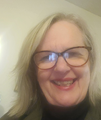 Mary Hanson Harrison is the current WILPF US Congress Coordinator and WILPF US past president (2014-2019). She brings not only an academic career but also a policy researcher and hands-on activist with and for nonprofit peace/feminist orientated organizations. She convened and participated in several presentations on ecofeminism and the necessity of a revolution in US agriculture and food systems: in The Hague, at the UN Commission on the Status of Women, and the WILPF International Congress – Ghana, and past WILPF US congresses.
Mary Hanson Harrison is the current WILPF US Congress Coordinator and WILPF US past president (2014-2019). She brings not only an academic career but also a policy researcher and hands-on activist with and for nonprofit peace/feminist orientated organizations. She convened and participated in several presentations on ecofeminism and the necessity of a revolution in US agriculture and food systems: in The Hague, at the UN Commission on the Status of Women, and the WILPF International Congress – Ghana, and past WILPF US congresses.
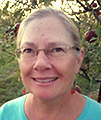 Patti Naylor farms with her husband George in West Central Iowa, growing organic corn, soybeans, oats, hay, cider apples, and chickens. Patti speaks and writes about agriculture, farm justice, and the principles of food sovereignty. Her focus is on organic production and agroecological principles in addressing the multiple environmental and social crises we face. She participated in a WILPF side event at the United Nations Commission on the Status of Women in 2018 (CSW62) in NYC on industrial agriculture’s negative impact on rural women. She is a board member of Wisconsin-based Family Farm Defenders, a member organization of National Family Farm Coalition and US Food Sovereignty Alliance. She also serves on the boards of the Iowa Organic Association and Pesticide Action Network North America. Patti is currently the focal point for the North American region of the Civil Society and Indigenous Peoples’ Mechanism for relations with the UN Committee on World Food Security.
Patti Naylor farms with her husband George in West Central Iowa, growing organic corn, soybeans, oats, hay, cider apples, and chickens. Patti speaks and writes about agriculture, farm justice, and the principles of food sovereignty. Her focus is on organic production and agroecological principles in addressing the multiple environmental and social crises we face. She participated in a WILPF side event at the United Nations Commission on the Status of Women in 2018 (CSW62) in NYC on industrial agriculture’s negative impact on rural women. She is a board member of Wisconsin-based Family Farm Defenders, a member organization of National Family Farm Coalition and US Food Sovereignty Alliance. She also serves on the boards of the Iowa Organic Association and Pesticide Action Network North America. Patti is currently the focal point for the North American region of the Civil Society and Indigenous Peoples’ Mechanism for relations with the UN Committee on World Food Security.
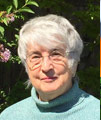 Nancy Price, the moderator, joined WILPF in 2002, first with Challenge Corporate Power/Assert the People’s Rights, then Save the Water Campaigns. Currently she is an At-Large Board Member and Earth Democracy Issue Committee Co-chair. In 2011 when “Save the Water” expanded as Earth Democracy, Nancy and the leadership team created campaign materials on the: human right to water, bottled water, environmental impacts of free trade agreements, Climate Justice+Women+Peace, Human Right to Safe Food, and Rights of Nature. Most recently, Earth Democracy has focused on the impact of war on the environment and helped create the militarypoisons.org project on contamination of water with PFAS and impact on public health. Find new campaigns, projects and actions on the website.
Nancy Price, the moderator, joined WILPF in 2002, first with Challenge Corporate Power/Assert the People’s Rights, then Save the Water Campaigns. Currently she is an At-Large Board Member and Earth Democracy Issue Committee Co-chair. In 2011 when “Save the Water” expanded as Earth Democracy, Nancy and the leadership team created campaign materials on the: human right to water, bottled water, environmental impacts of free trade agreements, Climate Justice+Women+Peace, Human Right to Safe Food, and Rights of Nature. Most recently, Earth Democracy has focused on the impact of war on the environment and helped create the militarypoisons.org project on contamination of water with PFAS and impact on public health. Find new campaigns, projects and actions on the website.
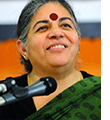 Vandana Shiva. After completing her Ph. D. in the foundations of quantum theory, in 1984 Dr. Vandana Shiva was compelled to look at agriculture when farmers in India rose to protest the Green Revolution and the catastrophic gas leak at the Union Carbide pesticide plant in Bhopal that killed thousands of people. Since then, Dr. Shiva has practiced and promoted an agriculture of peace, non-violence, and independent “free” farming. Dr. Shiva started Navdanya to save seeds from patenting and genetic engineering. In her recent book, Oneness vs 1%, she outlines how “Big Tech” is now hijacking agriculture to continue the violent path. She will share what we can do to protect the earth, farmers’ livelihoods, people’s health and people’s freedoms for present and future generations.
Vandana Shiva. After completing her Ph. D. in the foundations of quantum theory, in 1984 Dr. Vandana Shiva was compelled to look at agriculture when farmers in India rose to protest the Green Revolution and the catastrophic gas leak at the Union Carbide pesticide plant in Bhopal that killed thousands of people. Since then, Dr. Shiva has practiced and promoted an agriculture of peace, non-violence, and independent “free” farming. Dr. Shiva started Navdanya to save seeds from patenting and genetic engineering. In her recent book, Oneness vs 1%, she outlines how “Big Tech” is now hijacking agriculture to continue the violent path. She will share what we can do to protect the earth, farmers’ livelihoods, people’s health and people’s freedoms for present and future generations.
9:15 AM PDT
ACE: Paris, the UN & US Action for Climate Equity & Empowerment
This discussion—leading up to COP 26—will focus on the Actions for Climate Empowerment (ACE) Program of the UN: 1) a global process to educate and mobilize the nations’ citizenries to do all they can to stop, reverse, and recover from the climate crisis, a commitment made by each of the 198 nations under the Paris Agreement on Climate; 2) the citizen-led effort, now adopted as federal policy by the Biden Administration, that fulfilled for this nation its commitment to Paris, doing the work voluntarily that the last administration would not do at all; and 3) proposed in the upcoming federal budget is $200 million a year for ten years for the tens of thousands of US climate initiatives already underway, aimed to support, coordinate, and scale efforts to educate and mobilize the public and optimize citizen leadership, particularly among communities so long left out and whose talents are now at the center of achieving planetary recovery, climate justice, and a livable future. A team of young women scientists and climate activists, now developing a pilot of ACE on the central coast of California, will be on the panel: Emily Coren, Jennie Dusheck, Krista Myers, and Aviva Wolf-Jacobs.
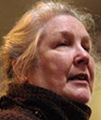 Dr. Nancy Glock-Grueneich is a member of Santa Cruz WILPF and host of the community TV/YouTube Series, The Future We Need and How to Get It.
Dr. Nancy Glock-Grueneich is a member of Santa Cruz WILPF and host of the community TV/YouTube Series, The Future We Need and How to Get It.
10:45 AM PDT
Who's Coming to Dinner & What's on the Menu: Upcoming Food Systems Summit
Women are key actors in food systems—producing, securing, processing, preparing, and serving food. So the current discourse on food systems transformation, initiated by the United Nations Food Systems Summit (UNFSS) in concert with the World Economic Forum, must be critically examined from a feminist perspective. How will the proposed “game-changing solutions” and the UNFSS processes impact multilateralism, human rights, including the right to food, people's food sovereignty, and women’s lives?
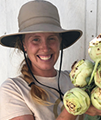 Jessie MacInnis is a small-scale, first generation farmer based in unceded Mi’kmaw territory (Nova Scotia), Canada. She and her sister grow vegetables and cut flowers for a farmers market and Community Supported Agriculture (CSA) program. She is currently the Youth Vice-President and Chair of the International Programs Committee of the National Farmers Union. Jessie is very active in La Via Campesina, particularly working to promote the UN Declaration on the Rights of Peasants and Other People Working in Rural Areas (UNDROP) and participating in the youth articulation, and is also a member of the Committee for World Food Security’s Civil Society Mechanism youth working group. She is currently completing a Master of Human Rights program, where her research has focused on the applicability of UNDROP to the Canadian context.
Jessie MacInnis is a small-scale, first generation farmer based in unceded Mi’kmaw territory (Nova Scotia), Canada. She and her sister grow vegetables and cut flowers for a farmers market and Community Supported Agriculture (CSA) program. She is currently the Youth Vice-President and Chair of the International Programs Committee of the National Farmers Union. Jessie is very active in La Via Campesina, particularly working to promote the UN Declaration on the Rights of Peasants and Other People Working in Rural Areas (UNDROP) and participating in the youth articulation, and is also a member of the Committee for World Food Security’s Civil Society Mechanism youth working group. She is currently completing a Master of Human Rights program, where her research has focused on the applicability of UNDROP to the Canadian context.
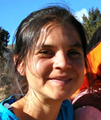 Maywa Montenegro is Assistant Professor in Environmental Studies at the University of California, Santa Cruz. She draws on political ecology, science and technology studies, and rural political economy to look broadly at knowledge politics in struggles over food systems. Specifically, she’s interested in connections between agrobiodiversity, Indigenous knowledges, and food security and nutrition; debates over gene editing and digitalization in food systems; and the role of scholar-activism in advancing agroecology and food sovereignty. She is a founding member of the Agroecology-Research Action Collective, an Associate Editor for the journal Agroecology and Sustainable Food Systems, and on the editorial board of the journal Agriculture & Human Values.
Maywa Montenegro is Assistant Professor in Environmental Studies at the University of California, Santa Cruz. She draws on political ecology, science and technology studies, and rural political economy to look broadly at knowledge politics in struggles over food systems. Specifically, she’s interested in connections between agrobiodiversity, Indigenous knowledges, and food security and nutrition; debates over gene editing and digitalization in food systems; and the role of scholar-activism in advancing agroecology and food sovereignty. She is a founding member of the Agroecology-Research Action Collective, an Associate Editor for the journal Agroecology and Sustainable Food Systems, and on the editorial board of the journal Agriculture & Human Values.
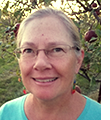 Patti Naylor farms with her husband George in West Central Iowa, growing organic corn, soybeans, oats, hay, cider apples, and chickens. Patti speaks and writes about agriculture, farm justice, and the principles of food sovereignty. Her focus is on organic production and agroecological principles in addressing the multiple environmental and social crises we face. She participated in a WILPF side event at the United Nations Commission on the Status of Women in 2018 (CSW62) in NYC on industrial agriculture’s negative impact on rural women. She is a board member of Wisconsin-based Family Farm Defenders, a member organization of National Family Farm Coalition and US Food Sovereignty Alliance. She also serves on the boards of the Iowa Organic Association and Pesticide Action Network North America. Patti is currently the focal point for the North American region of the Civil Society and Indigenous Peoples’ Mechanism for relations with the UN Committee on World Food Security.
Patti Naylor farms with her husband George in West Central Iowa, growing organic corn, soybeans, oats, hay, cider apples, and chickens. Patti speaks and writes about agriculture, farm justice, and the principles of food sovereignty. Her focus is on organic production and agroecological principles in addressing the multiple environmental and social crises we face. She participated in a WILPF side event at the United Nations Commission on the Status of Women in 2018 (CSW62) in NYC on industrial agriculture’s negative impact on rural women. She is a board member of Wisconsin-based Family Farm Defenders, a member organization of National Family Farm Coalition and US Food Sovereignty Alliance. She also serves on the boards of the Iowa Organic Association and Pesticide Action Network North America. Patti is currently the focal point for the North American region of the Civil Society and Indigenous Peoples’ Mechanism for relations with the UN Committee on World Food Security.
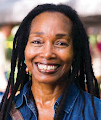 Jennifer Taylor is the granddaughter of a sharecropper, and an organic small farmer in Georgia. She is an advocate for underserved small farmers, Black Indigenous farmers and farmers of color and their agroecology farming practices and organic farming systems strategies that enable wellbeing and change. Jennifer is a member of the USFSA, CoPresident of IFOAM North America, Convener of INOFO North America, Vice President of the Organic Farmers Association, and serves on several Boards. At Florida Agricultural and Mechanical University, Jennifer is associate professor where she developed and implemented the StateWide Small Farm Program, a participatory capacity building program to empower and equip underserved small farm populations and their communities.
Jennifer Taylor is the granddaughter of a sharecropper, and an organic small farmer in Georgia. She is an advocate for underserved small farmers, Black Indigenous farmers and farmers of color and their agroecology farming practices and organic farming systems strategies that enable wellbeing and change. Jennifer is a member of the USFSA, CoPresident of IFOAM North America, Convener of INOFO North America, Vice President of the Organic Farmers Association, and serves on several Boards. At Florida Agricultural and Mechanical University, Jennifer is associate professor where she developed and implemented the StateWide Small Farm Program, a participatory capacity building program to empower and equip underserved small farm populations and their communities.
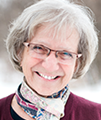 Nettie Wiebe farms in Saskatchewan, Canada, growing organic grains and pulse crops as well as raising cattle. She served in elected leadership positions of the National Farmers Union for ten years and was the first woman to lead a national farm organization in Canada. The NFU was a founding member of the global Via Campesina movement where Nettie played a leadership role as a member of the International Coordinating Committee from 1996 to 2004. She continues to work internationally, representing social movements at the UN Committee on World Food Security in Rome.
Nettie Wiebe farms in Saskatchewan, Canada, growing organic grains and pulse crops as well as raising cattle. She served in elected leadership positions of the National Farmers Union for ten years and was the first woman to lead a national farm organization in Canada. The NFU was a founding member of the global Via Campesina movement where Nettie played a leadership role as a member of the International Coordinating Committee from 1996 to 2004. She continues to work internationally, representing social movements at the UN Committee on World Food Security in Rome.
12:00 PM PDT
Lessons from Cuba: Women on the Front Lines Establishing Democracy
Cuba is facing its worst crisis economically since the 1980s because of the Covid-19 pandemic and the 61-year-old US blockade. Yet this small country of 11 million people has done more for developing and some developed countries than any other country in the world to fight the pandemic. How can Cuba do this amidst their own crisis? Through this workshop we will learn about Cuba’s contributions in the battle against Covid-19, the role that women play in this battle, and Cuba’s healthcare system and robust biopharma industry. Learn what you can do to end the blockade and why it is so important now, especially for people of color in Africa, Latin America, and the Caribbean.
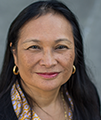 Cindy Domingo, a long-time social activist has used her skills as a writer, speaker, organizer, and community bridge builder to create fundamental change and to build international solidarity between her communities and working people around the world. Currently, Cindy is Co-chair of WILPF's Cuba and the Bolivarian Alliance Issues Committee and Chair of US Women and Cuba Collaboration. Over the past 17 months, she has been in the leadership of the International US-Cuba Normalization Conference Coalition and the Saving Lives Campaign. She has been a member of WILPF since the 1980s and served on the National Board and various WILPF committees.
Cindy Domingo, a long-time social activist has used her skills as a writer, speaker, organizer, and community bridge builder to create fundamental change and to build international solidarity between her communities and working people around the world. Currently, Cindy is Co-chair of WILPF's Cuba and the Bolivarian Alliance Issues Committee and Chair of US Women and Cuba Collaboration. Over the past 17 months, she has been in the leadership of the International US-Cuba Normalization Conference Coalition and the Saving Lives Campaign. She has been a member of WILPF since the 1980s and served on the National Board and various WILPF committees.
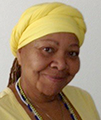 Kathryn Hall-Trujillo, MPH, is an Ashoka Fellow and Founder of the Birthing Project USA. In addition, she is an adjunct faculty at Charles R. Drew University of Medicine and Science Urban Public Health and Scholar of the Cuba Health Care System.
Kathryn Hall-Trujillo, MPH, is an Ashoka Fellow and Founder of the Birthing Project USA. In addition, she is an adjunct faculty at Charles R. Drew University of Medicine and Science Urban Public Health and Scholar of the Cuba Health Care System.
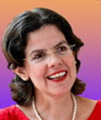 Ambassador Lianys Torres Rivera, Chargé d’Affaires a.i., Embassy of Cuba in Washington D.C., United States. From 2015 to 2017 she was part of the Cuban delegation that met with the US Government authorities to discuss the re-establishment of diplomatic relations and the re-opening of embassies in both countries. She was also part of the Cuba-US Bilateral Commission, the Cuba-US Bilateral Economic Dialogue as well as other Cuba-US bilateral dialogues on regulatory issues, human rights, traffic in persons, the establishment of direct postal services, renewable energy and banking issues.
Ambassador Lianys Torres Rivera, Chargé d’Affaires a.i., Embassy of Cuba in Washington D.C., United States. From 2015 to 2017 she was part of the Cuban delegation that met with the US Government authorities to discuss the re-establishment of diplomatic relations and the re-opening of embassies in both countries. She was also part of the Cuba-US Bilateral Commission, the Cuba-US Bilateral Economic Dialogue as well as other Cuba-US bilateral dialogues on regulatory issues, human rights, traffic in persons, the establishment of direct postal services, renewable energy and banking issues.
1:00 PM PDT
Feminist Foreign Policy: Path to Peace, Freedom and Justice
Odile Hugonot-Haber opens the discussion. Using a range of data, Patricia Hynes shows that security of women and girls who are free from violence, discrimination, and inequality contributes to genuine national security. She describes the spirit and reality that must infuse a feminist foreign policy to propose principles for an authentic US feminist foreign policy for peace and security,including opposing US militarism, women at all policy and peace negotiations, and creating a Department of Peace.
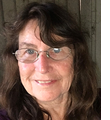 Odile Hugonot-Haber, co-chair of MEPJAC, will speak on US weapons sales to the Middle East. She came to the US from France and was a Registered Nurse for about 30 years. As an activist she was at first part of Women In Black, a feminist international movement against war. She joined WILPF US in 1993 and has been part of the Middle East Committee, and on and off the chair of the Ann Arbor/Ypsilanti branch in Michigan. She has travelled many times to Israel and Palestine. She serves on the board of World Beyond War, writes articles about war and peace, and is a member of the Disarm issue committee. She focuses on the Weapons of Mass Destruction Free Zone in the M.E. In San Francisco with WILPF, in a reunion she was introduced to the feminist foreign policy initiated by Sweden.
Odile Hugonot-Haber, co-chair of MEPJAC, will speak on US weapons sales to the Middle East. She came to the US from France and was a Registered Nurse for about 30 years. As an activist she was at first part of Women In Black, a feminist international movement against war. She joined WILPF US in 1993 and has been part of the Middle East Committee, and on and off the chair of the Ann Arbor/Ypsilanti branch in Michigan. She has travelled many times to Israel and Palestine. She serves on the board of World Beyond War, writes articles about war and peace, and is a member of the Disarm issue committee. She focuses on the Weapons of Mass Destruction Free Zone in the M.E. In San Francisco with WILPF, in a reunion she was introduced to the feminist foreign policy initiated by Sweden.
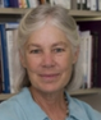 Pat Hynes (She/Her) is a retired environmental engineer and professor of environmental health from Boston University School of Public Health, where she co-directed community-based environmental justice projects in Boston Public Housing and diverse, low-income neighborhoods in Boston. For her work, she has received many regional and national awards. She works, writes and speaks on peace, social justice, women’s equality, and environmental justice issues. She directed the Traprock Center for Peace and Justice in western Massachusetts from 2010 to 2021. The impact of US militarism on countries and people, especially women, across the world, is a major focus of her writing, speaking, and activism. She is an at-large member of WILPF and has partnered with WILPF Sierra Leone and WILPF Cameroon since the WILPF 2018 Congress in Ghana.
Pat Hynes (She/Her) is a retired environmental engineer and professor of environmental health from Boston University School of Public Health, where she co-directed community-based environmental justice projects in Boston Public Housing and diverse, low-income neighborhoods in Boston. For her work, she has received many regional and national awards. She works, writes and speaks on peace, social justice, women’s equality, and environmental justice issues. She directed the Traprock Center for Peace and Justice in western Massachusetts from 2010 to 2021. The impact of US militarism on countries and people, especially women, across the world, is a major focus of her writing, speaking, and activism. She is an at-large member of WILPF and has partnered with WILPF Sierra Leone and WILPF Cameroon since the WILPF 2018 Congress in Ghana.
2:15 PM PDT
A Revolution of Compassion for Peace
The Parents Circle Families Forum (PCFF) is a joint Israeli-Palestinian organization made up of more than 600 bereaved families. Their common bond is that they have lost a close family member to the conflict. But instead of choosing revenge, they have chosen to work together to prevent further bereavement, to create dialogue, reconciliation, and hopefully peace. Israeli and Palestinian mothers who lost children in the conflict, all members of the PCFF, will be interviewed. Join Orly Benaroch Light in a moving interview about loss, grief, love, humanity, and healing.
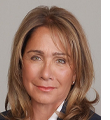 Orly Benaroch Light is an entrepreneur and business development consultant. She is an activist for women's achievement and empowerment, and a human rights defender. She is also a speaker, children's book author, food enthusiast, and a mom.
Orly Benaroch Light is an entrepreneur and business development consultant. She is an activist for women's achievement and empowerment, and a human rights defender. She is also a speaker, children's book author, food enthusiast, and a mom.
3:00 PM PDT
Working Our Way Out of a (She)cession: Creating an Economy of Our Own
This past year WILPF partnered with a new and promising feminist economic alliance, An Economy of Our Own (AEOO). The organizations of this alliance are already working on woman-centered solutions; we’ll share with you the highlights of five intersectional economic conversations we sponsored and explain why women’s ways of knowing are foundationally important for confronting a ruthless economy growing more ruthless. We insist on making this scary topic—often accompanied by shame, regret, or a sense of falling short—far more personal and relevant to women. Don’t expect man-splaining obfuscation, insider lingo, or business as usual!
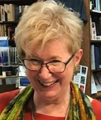 Rickey Gard Diamond, the panel moderator, is the founding organizer of the new educational alliance, AEOO, working in partnership with WILPF US. A journalist and fiction writer, Rickey has long focused on money, politics, and cultural change. She taught writing and literature, feminist, and media studies at Vermont College for over 20 years. In 2011 she was awarded a National Newspaper Association award for her article series, “An Economy of Our Own”; in 2014 she won a Hedgebrook fellowship for work on Screwnomics: How the Economy Works against Women and Real Ways to Make Lasting Change. Rickey’s column at Ms. Magazine, “Women Unscrewing Screwnomics,” can be found online; her novel, Second Sight, from Calyx Books, and her collection of short stories, Whole Worlds Could Pass Away from Rootstock Publishing can be ordered at your local bookstore and online. (photo courtesy of AEOO)
Rickey Gard Diamond, the panel moderator, is the founding organizer of the new educational alliance, AEOO, working in partnership with WILPF US. A journalist and fiction writer, Rickey has long focused on money, politics, and cultural change. She taught writing and literature, feminist, and media studies at Vermont College for over 20 years. In 2011 she was awarded a National Newspaper Association award for her article series, “An Economy of Our Own”; in 2014 she won a Hedgebrook fellowship for work on Screwnomics: How the Economy Works against Women and Real Ways to Make Lasting Change. Rickey’s column at Ms. Magazine, “Women Unscrewing Screwnomics,” can be found online; her novel, Second Sight, from Calyx Books, and her collection of short stories, Whole Worlds Could Pass Away from Rootstock Publishing can be ordered at your local bookstore and online. (photo courtesy of AEOO)
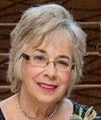 Marybeth Gardam, panel co-moderator, set up a Farmworker Coalition in Georgia and served as the director of Central Georgia Peace Center. She later became active with WILPF US in Iowa and now sits on the advisory board of An Economy of Our Own, while also heading WILPF US’s issue committee, Women, Money and Democracy. This committee has produced a widely taught course on corporate personhood, still available online, and recently created a sourcebook on public banking and activism. Its text will be used in a new Public Banking Learning Circle that begins Aug. 27, organized by WILPF US, An Economy of Our Own, and the Public Banking Institute.
Marybeth Gardam, panel co-moderator, set up a Farmworker Coalition in Georgia and served as the director of Central Georgia Peace Center. She later became active with WILPF US in Iowa and now sits on the advisory board of An Economy of Our Own, while also heading WILPF US’s issue committee, Women, Money and Democracy. This committee has produced a widely taught course on corporate personhood, still available online, and recently created a sourcebook on public banking and activism. Its text will be used in a new Public Banking Learning Circle that begins Aug. 27, organized by WILPF US, An Economy of Our Own, and the Public Banking Institute.



